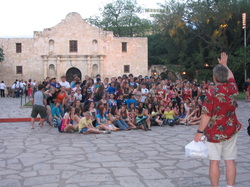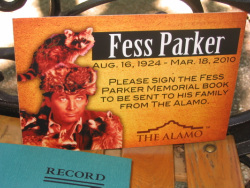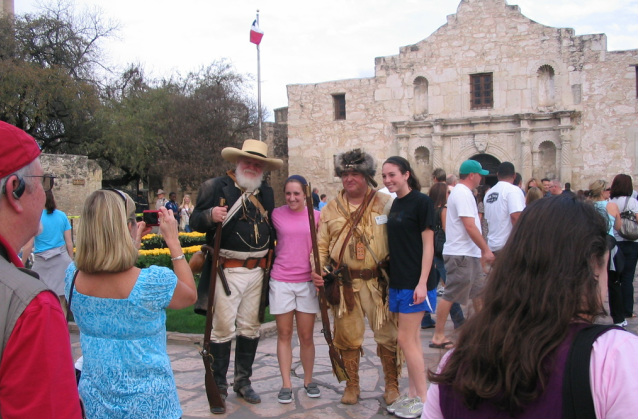
I kept thinking about this when I was in San Antonio working on Born on a Mountaintop.
I had followed Crockett's footsteps from his east Tennessee birthplace to the Alamo, hoping to learn how a remarkable life and a mythic afterlife had come to be permanently intertwined. Parker's screenplay made me wonder: What would the real David Crockett think if he could somehow transport himself to 21st-century San Antonio? How astonished would he be to find a neon Crockett Hotel sign looming above the Alamo church, or a boisterous school group posing for photos in Alamo Plaza -- perhaps within yards of where he died? And what on earth would he make of the sight of his great-great-great grandson, David Preston Crockett, decked out in homemade Davy gear and posing in the plaza as well?
My book ends with a chapter set in San Antonio, and reporting it was a fascinating, often moving experience. I got to hear Crockett descendants sing backup on "The Ballad of Davy Crockett" in the Spanish Governor's Palace. I watched the sun rise behind the Alamo, 175 years after the battle, during a ceremony that honored both the defenders and their Mexican foes. I set out to examine every spot where David might have died, as well as all the places his ashes could have ended up. (There are many of both.) And I heard a couple of Crockett-obsessed Australians give a PowerPoint-enhanced lecture they called "Portraits of David Crockett's Last Stand: Iconography and Symbolism of Heroics throughout Western Culture."

Parker died at 85, shortly before my first San Antonio trip in 2010, and the Alamo put out a memorial book for visitors to sign. My favorite entry shows how little the line between reality and myth can matter when it comes to characters we love and stories that help us figure out who we are.
"I'll miss you Fess (Davy)," it reads. "You were part of my childhood. God Bless."

 RSS Feed
RSS Feed